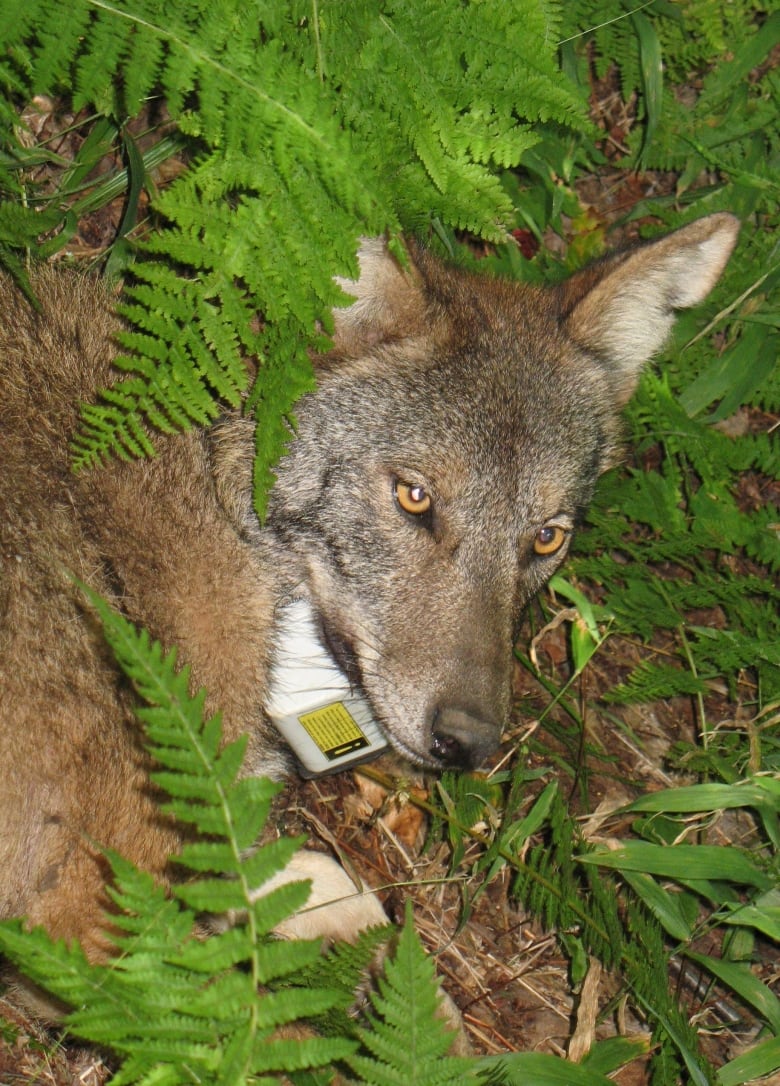Coyotes are moose killers, study finds
Study reports 4 confirmed cases of adult moose killed by coyotes and coyote-wolf hybrids


A study published Thursday in the Canadian Journal of Zoology documented four confirmed cases between January 2009 and January 2010 in which different packs of coyotes or coyote-wolf hybrids killed adult moose in an area west of Ontario’s Algonquin Park.
In one case, the moose — a 20-month old female that was likely more than 200 kilograms — was brought down by a pack of just two coyotes.
“That was impressive,” acknowledged John Benson, lead author of the report, who conducted the research while he was a graduate student at Trent University in Peterborough, Ont.
On the other hand, he said, it’s not really surprising, since it’s known that when packs of wolves attack a moose, most of the work is done by only one or two individuals.
Prior to the study, most scientists had assumed that coyotes don’t kill moose, said Benson, who was unable to find any documented cases of coyotes killing adult moose, although they had been previously known to kill calves..
Known for eating 'small' mammals
The Ontario Ministry of Natural Resources lists a coyote's diet as mainly rabbits, hares and deer in the winter and “small” mammals, wild berries, birds, amphibians and grasshoppers in the summer.
However, Benson, who is now a wildlife biologist with the Alaska Department of Fish and Game, suspected coyotes around Algonquin Park might be capable of bringing down adult moose. In that area, the coyotes are large, the wolves are small and relatively rare (making up only seven per cent of the joint wolf-coyote population), and about 30 per cent of the joint wolf-coyote population are hybrids. In addition, some known coyote packs have hunting territories where there are lots of moose and very few deer.
Benson had the chance to test his hypothesis during a project to research the habits of coyote-wolf hybrids. As part of the project, Benson and Ontario Ministry of Natural Resources wildlife researcher Brent Patterson trapped coyotes and coyote-wolf hybrids from 10 different packs and placed GPS tracking collars on them — a task that wasn’t easy.
“They’re incredibly smart so you have to be incredibly careful,” Benson recalled. “We’d boil the traps to remove all the [human] scent. We never touch them with bare hands. You basically try to make the area look exactly the way it did when you found it. Still, sometimes they sort of sense that something is wrong and don’t get trapped.”
Once the animals had been equipped, if the GPS showed they spent more than three hours in a given area, it was a sign that they may have made a kill, and the researchers went to see what the kill was.
4 confirmed, 5 suspected cases
In addition to the four confirmed wolf kills, there were another five cases where moose appeared to have been killed by coyotes or hybrids, but that couldn’t be confirmed. While three out of the four packs that made the confirmed kills contained at least one coyote-wolf hybrid, Benson said that wasn't enough evidence to say whether the hybrids are more likely than coyotes to kill moose.

Benson said he would be most interested to see whether the coyotes in Ontario are unusual or whether those in other parts of North America also kill moose.
One question raised by the findings is whether humans ought to fear coyotes the way we fear the “big, bad wolf.”
Benson points out that coyotes and wolves avoid humans whenever possible — one of the things that made trapping them very challenging.
“It’s good to have a healthy respect and fear, when you’re out in the woods, of any wild animals,” he said. “But it’s rare that a wolf or coyote attacks a human. So I don’t think our finding here really changes that a whole lot.”